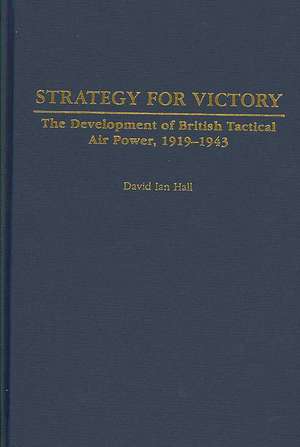Strategy for Victory: The Development of British Tactical Air Power, 1919-1943: Praeger Studies in Diplomacy and Strategic Thought
Autor David Ian Hallen Limba Engleză Hardback – 29 dec 2007 – vârsta până la 17 ani
Din seria Praeger Studies in Diplomacy and Strategic Thought
- 24%
 Preț: 461.60 lei
Preț: 461.60 lei - 28%
 Preț: 419.54 lei
Preț: 419.54 lei - 28%
 Preț: 498.33 lei
Preț: 498.33 lei - 28%
 Preț: 436.80 lei
Preț: 436.80 lei - 18%
 Preț: 355.15 lei
Preț: 355.15 lei - 24%
 Preț: 461.95 lei
Preț: 461.95 lei - 27%
 Preț: 593.81 lei
Preț: 593.81 lei - 27%
 Preț: 439.17 lei
Preț: 439.17 lei - 28%
 Preț: 437.40 lei
Preț: 437.40 lei - 24%
 Preț: 463.55 lei
Preț: 463.55 lei - 27%
 Preț: 378.02 lei
Preț: 378.02 lei - 27%
 Preț: 463.88 lei
Preț: 463.88 lei - 35%
 Preț: 461.35 lei
Preț: 461.35 lei - 24%
 Preț: 460.60 lei
Preț: 460.60 lei - 27%
 Preț: 511.72 lei
Preț: 511.72 lei - 28%
 Preț: 437.31 lei
Preț: 437.31 lei - 28%
 Preț: 375.91 lei
Preț: 375.91 lei
Preț: 668.98 lei
Preț vechi: 960.54 lei
-30% Nou
Puncte Express: 1003
Preț estimativ în valută:
128.04€ • 133.17$ • 107.30£
128.04€ • 133.17$ • 107.30£
Carte tipărită la comandă
Livrare economică 14-28 martie
Preluare comenzi: 021 569.72.76
Specificații
ISBN-13: 9780275977672
ISBN-10: 0275977676
Pagini: 272
Dimensiuni: 156 x 235 x 25 mm
Greutate: 0.54 kg
Editura: Bloomsbury Publishing
Colecția Praeger
Seria Praeger Studies in Diplomacy and Strategic Thought
Locul publicării:New York, United States
ISBN-10: 0275977676
Pagini: 272
Dimensiuni: 156 x 235 x 25 mm
Greutate: 0.54 kg
Editura: Bloomsbury Publishing
Colecția Praeger
Seria Praeger Studies in Diplomacy and Strategic Thought
Locul publicării:New York, United States
Notă biografică
David Ian Hall has a D.Phil. in modern British history from the University of Oxford. He is a Lecturer in the Defence Studies Department, King's College London, based at the Joint Services Command and Staff College and in 2001 he was appointed to the Higher Command and Staff Course as an Air Power Academic specialist. He is a founding editor of Defence Studies: the Journal of the JSCSC.
Recenzii
This immaculately researched volume, based (as he acknowledges) on one of his academic theses, is very well written, easy to read and insightful throughout. . . . This is a very good book and addresses in excellent manner the previous lack of consideration of how British tactical air power doctrine developed from the Armistice to the end of 1943. . . . Dr. Hall has done air power practitioners a great service in this book, and I unhesitatingly recommend it.
This book is well written and easy to read. It is of particular interest to Americans interested in the experiences of the British in developing tactical air power while Americans were still feeling their way.
This book is well written and easy to read. It is of particular interest to Americans interested in the experiences of the British in developing tactical air power while Americans were still feeling their way.





